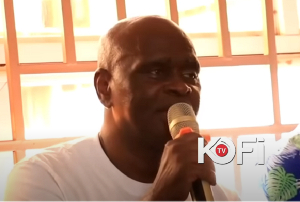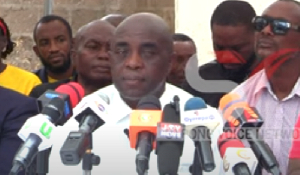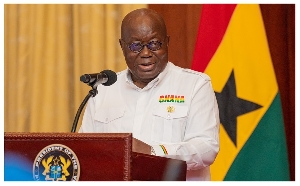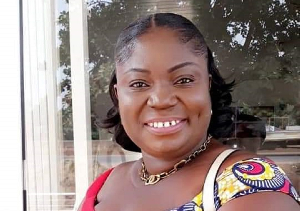Opinions of Tuesday, 10 February 2015
Columnist: Amuna, Paul
Kwame Nkrumah and Bringing Unity to Ghana Part Two
Paul Amuna
Taken from Africa Must United Chapter 9 continued…
First of all let me correct an error in the chapter number for this topic. It is chapter nine, (not chapter four) as I inadvertently stated in Part One.
Secondly, let me also declare that my intention here in these articles is to provide a historical account of what from Kwame Nkrumah’s own perspective were the fundamental problems and challenges facing the Gold Coast in the lead up to independence, and subsequently the ‘New Ghana’ immediately post-independence. He has described the situation as “dire”, “desperate” and ‘a state of emergency’. He has suggested that there were ‘treasonable acts’ including acts of violence resulting in loss of life for which the situation could not be allowed to continue to deteriorate unabated.
Thirdly, my own first encounter with Kwame Nkrumah was in 1975 when as a ‘little form one boy’ and appointed class librarian by David Ganderton, my English and French tutor and Class master, it was my responsibility to ‘loan out’ and ‘receive back’ all class library books to my fellow classmates. In other words, I actually kept the key to the class ‘library cupboard’. I stumbled upon a book by one Peter Omari, a Ghanaian academic, journalist and writer. The title was “Kwame Nkrumah: The Anatomy of an African Dictatorship”. Published in 1970 in New York by the African Publishing Corporation. I must confess, the more I read Omari’s book (even at that tender early teenage), the more fascinated I became and wished to know and understand more about this man who had been completely ‘dissected’ and laid bare before my own eyes. I felt sorry for all the characters mentioned in the book but somehow, I felt the need to know Nkrumah himself even more. It was years later, and after being fortunate to read his own works, and that of others about him, that I have come to have a better understanding of the man, his philosophy, life, work and legacy. I am by no means an Nkrumah apologist, nor am I sycophantic or a ‘blind follower’ as some people like to label all Nkrumaists.
Nor did I ever think that Nkrumah was ‘godlike’ or that he never faltered and was perfect. The more I have read his works and about him, the more I have come to identify with a very troubled man in a hurry who actually never really ‘enjoyed life’ as we know it, but who devoted most of his for something he believed in passionately (irrespective of whether the rest of us think he was doing the right thing or not). As to his earnestness, there is no question in my mind. His sense of urgency was almost palpable because he knew that as a human, he was weak, frail, prone to errors (and yes, he made many, like the rest of us). You just felt that this man had almost decided of his own accord to carry a huge load – that of Africa, like his very life depended upon it. He had such a conviction and believed so much in the vision that it was difficult to persuade him otherwise and I personally believe some of his own failings stemmed from his very passion for a one united and strong and prosperous Africa, an equal member of the family of nations.
Before I continue to present Nkrumah’s take on this topic, permit me to acknowledge all the many comments that people posted on the subject. These reflect the different opinions and positions taken by many in Ghana on our political history. I take particular note of those whose focus was mainly on the introduction of the Preventive Detention Act (PDA) and how WRONG it was. Nkrumah himself describes a ‘stage pf siege’ bothering on anarchy on the way that the opposition was behaving at the time. He also alluded to collusion with external interests whose primary goal was for the failure of our young democracy presumably because of the path it had chosen to its development and prosperity. I appreciate all your comments and in some cases have tried to respond, but mainly either to clarify an issue or to remind people that these are not my own views and are not meant to justify, but rather to inform and hopefully educate some of us on Nkrumah’s own personal feelings, reactions and actions in respect of what he saw as a nation rapidly descending into chaos for the reasons already presented in part one.
So what were some of the actions the CPP government brought in to help address the issues? Here is what Nkrumah further says:
“My government brought in the Avoidance of Discrimination Bill to deal with the control of political parties based on tribal or religious affiliations. Its full name was ‘An Act to prohibit organizations using or engaging in racial or religious propaganda to the detriment of any other racial or religious community, or religious affiliations, and for other purposes in connection therewith’. The effect was to bring the formation of the various opposition parties into a United Party. Oddly enough, our show of firmness was reflected in a temporary change in the tone of the foreign press.
Nkrumah went on to quote the following example from the Foreign Press (The respected British Paper, The Economist): “The Economist, for instance, summed up the negative position of the opposition in a leading article: ‘The criticism that has always been labelled against the N.L.M., (which stands for National Liberation Movement) and which is much more applicable to the present bunch of critics (the United Party), is that while accusing the government of corruption, totalitarianism, destructiveness and inefficiency, it has offered no alternative policies of its own. The opposition has two rather contradictory answers to this: first, that the United Party is soon to announce a constructive policy (which has never come) and, second, that its programme has to be vague of the government will appropriate, and spoil its ideas. In Ghana this fear is not altogether baseless. The only fundamental difference of opinion between the government and the opposition is over the relative power of the centre and the regions. Since there is no basic difference in their approach to, say, employment, education and housing, the opposition can only criticize in a rather woolly way, saying, in effect, that they would do the same things, only better and more honestly’ (The Economist, 16 November, 1957).
To which article Nkrumah had this to say:
“Unfortunately, the fundamental difference over the relative power of the centre and the regions went deeper than The Economist’s passing reference to it would suggest. It was the core of the dissension between the Government and the opposition. It involved the whole question of our continuance as a unitary state exercising the democratic principles of majority rule. The opposition was employing the lever given to it by the constitutionally entrenched clauses enthroning the special position of Ashanti, to force by disruptive measures the secession of the region.
Here was the root cause of the bitter feuding that had gripped our beloved country on the eve of independence and continued to mar and harass our days of freedom. The N.L.M. had based its support on the Asantehene and other autocratic chiefs anxious to retain the special privileges and powers which the British colonial Indirect Rule had conferred upon them. Their confidence in the success of their coercive methods was sustained by the willing allies they found among imperialist groups. It has been the unfortunate experience in all colonial countries where the national awakening has crystallized into a popular movement seeking the fundamental democratic right to the rule of the majority, that vested interests have come to the aid of minority separatist groups”. He goes on to cite examples of these from Apartheid South Africa to Rhodesia, Kenya and Nysaland.
Then he continues: “For two and a half years of difficult state building my government took no action to limit the freedom of the press. The opposition was quick to exploit this freedom and soon debased it into licence. Each day, its newspapers came out with screaming headlines about the perfidy of the government. They heaped abuse and libel upon my colleagues and me. They wrote and preached, they called press conferences with local and foreign correspondents, they addressed public meetings all over the country, stigmatizing the government and singling out me and my immediate associates for special attack, abuse and ridicule.
During the struggle for independence, we had emphasized the need for national unity for the attainment of freedom, and for the enormous responsibilities of statehood that would follow. These call for a supreme effort on the part of every citizen. How could our people pull their weight with zeal and dedication when it was ceaselessly being drummed in them that their government was unscrupulous, inept and corrupt; that their leaders were venal and power-thirsty, and that the national effort was evoked, not for the greater glory of Ghana but for the personal glory of Kwame Nkrumah? This was the freedom of expression. This was the irresponsible licence, and if allowed to continue unbridled, it could have undermined our state, our independence and the people’s faith in themselves and their capacities.
This is what Nkrumah had to say about the situation: “This was the internal picture. The impact on the movements for liberation in the rest of Africa could be just as unfortunate. It was likely to cause despondency in their ranks and friction between us and their leaders, who might have no means of recognizing the falsity of opposition attacks upon us. The colonial powers would also not be unmindful of these happenings and possibly use them as a pretext for delaying their departure from trust and colonial territories by citing the magnified political ‘battle’ in Ghana as a frightening example of premature independence.
We came to the point where it was obvious that the government must take action if we were to avert the dangers inherent in a false situation. The imposition of any form of press censorship was an idea most repugnant to me, since it ran counter to everything I had always believed in, everything for which I had struggled in my life. Freedom of expression had been one of the essential rights for which I had fought. I had gone to prison for daring to say things the colonial administration had not liked.
Our fight had been a fight for the freedom of our people, and the native inhabitants of the land, against an alien regime that denied freedom. Now that we had won our emancipation and launched our national existence, were we to allow our independence to be endangered by the very people whose speech and action had abetted the colonial regime? We had embarked upon a course that aimed to push forward the clock of progress. Were others to be given the freedom to push it back? We had to face up squarely to the question whether a seedling less developed threatened by the unpatriotic deeds of a minority opposition, could permit itself all the forms which established democracies have taken generations to evolve. A young state has to work doubly hard, has to deny itself many of the trimmings that have become accepted norm in older nations.”
Nkrumah further says in concluding the chapter: “Our experience is proving that democracy as a functioning system in newly emergent states must inevitably undergo many stresses. Its machinery and pattern of government are being superimposed upon social structures different from those in which they originally developed. Democracy has undergone development to its present accepted forms in the advanced countries in circumstances of compulsion that have yet to be reached in young nations now attempting to throw themselves apace out of a stagnating economic backwardness into modern industrialized settings able to provide wide material and social benefits for all the people. It is not at all accidental that the great exponents of democracy are precisely those countries where industrial growth has achieved its highest levels within free development. That growth, accompanied at periods by social distress and discontent, was based upon vast private accumulations of capital and proceeded at a pace which was slower in countries that embarked upon the industrial road faster in those who started later.
Recently emerging states like Ghana are having to tackle the task of industrialization at the period of its highest development in the old-established democracies, in conditions which have precluded the amassing of large capital reserves in the hands of private citizens. Upon the government, therefore, devolves the task of planning and establishing the main base of economic development and pushing it through at a speedy rate against the formidable odds of an uneducated population devoid of technical and scientific knowledge, and the lack of even the most primitive industrial foundation. Time is the essence of our problem, and we are in duty bound to use the overwhelming mandate given to us by our people to advance their standards of life, to employ time for the purpose of securing the quickest possible economic and social development for our country.
This duty resolves itself into the obligation to use the power bestowed upon us by the majority decision of the people to the limit of the task it imposes. To abdicate any part of that power to an opposition that has been repeatedly rejected by the people and engages itself in activities prejudicial to the independence, safety and forward growth of the State, would, I submit, be a betrayal of the popular will and trust. It would be completely incomprehensible to our people, and in the present state of their educational development would place our whole future in jeopardy.
We intend to preserve the rights and freedom of our people, so long as these are exercised within the limits of the law, and without threat to the security of the nation. We welcome criticism, but we will not tolerate subversive and terroristic activities against the State, and illegal acts designed to promote the selfish greed of a dissident minority, supported by alien interests”.
My own remarks This concludes the chapter and no doubt provides lots of food for thought. I wonder what readers make of it all and would hope to glean from comments and feedback to attempt a summation. In reading all these postings and reflecting on our political history and our early leaders, let us all remember one thing and one thing only: we who call ourselves Ghanaians, wherever we are and whatever we do must always remember, we have only one Ghana and I believe as Ghanaians (and Africans), we have one common destiny although some still refuse to appreciate this. Until, and unless we begin to appreciate the special place our nation occupies, and the little we can each do to make it a better place for generations to come, we can continue to shout our vocal cord hoarse, fight, even split till thy kingdom come, and we would have achieved absolutely nothing, except to prove to the colonialists that ‘the black man is incapable of handling his own affairs’.
Love and respect even where we differ fundamentally or ideologically.
Entertainment











